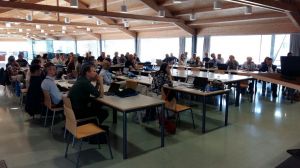- Details
Farming lies at the heart of much of the EU’s socio-economic framework. In 2015, it provided 9.2 million direct jobs and a GDP over € 500 billion
However, recent policies of agriculture based on intense mechanisation, excessive use of external inputs (water, energy, fertilisers, pesticides etc) and monocrop farming has resulted in soil degradation, reduced biodiversity and increased economic risk for European farmers.
- Details
The Diverfarming project is under way, and will work for five years with the aim of offering a change in paradigm that banishes intensive agriculture and improves biodiversity
Intensive agriculture based on monocropping has endangered the biodiversity of species in Europe, which comes at a high environmental cost. The international team involved in the Diverfarming project, within the European Commission’s Horizon 2020 programme, and in which the Technical Universities of Cartagena and Cordoba participate, has set the objective of proposing a change of paradigm in agricultural management and practices.











